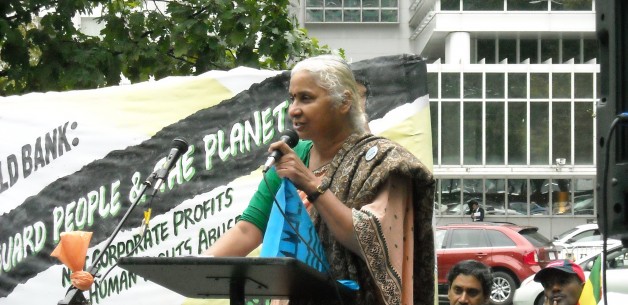Activist Medha Patkar speaking on resistance to the Sardar Sarovar dam during the 2014 World Bank Annual Meetings.
On Tuesday, June 7th, the Tom Lantos Human Rights Commission of the U.S. Congress held a hearing on the advancement of human rights in India. In his opening remarks, Congressman James P. McGovern, Human Rights Commission Co-Chairman, discussed the lasting human rights impacts of the Sardar Sarovar dam.
This dam on the Narmada River is a legacy project of the World Bank. The severe human and environmental impacts caused by the dam’s construction in the 1980s, resisted by local organizations such as Friends of the River Narmada, contributed to sparking the demand for World Bank environmental and social safeguard policies. According to Congressman McGovern,
In one well-known case, that of the Sardar Sarovar dam on the Narmada River, communities have been fighting for more than 30 years to keep from being uprooted, or to be appropriately compensated for the damage already done. Forced displacement due to macro-development projects is also a human rights violation.
This Human Rights Commission hearing was called to discuss a number of human rights challenges in contemporary India. In particular, “crackdowns on groups or individuals critical of the Indian government have many concerned that the rights to freedom of speech and freedom of association are being increasingly curtailed” in the country. Panelists on this issue included John Sifton (Human Rights Watch), Ajit Sahi (Human Rights Activist & Journalist), and T. Kumar (Amnesty International).
In the context of development projects such as the Sardar Sarovar dam, Congressman McGovern highlighted the “fundamental obligation of the Indian authorities to take into account the human rights of people affected by major development projects.”

